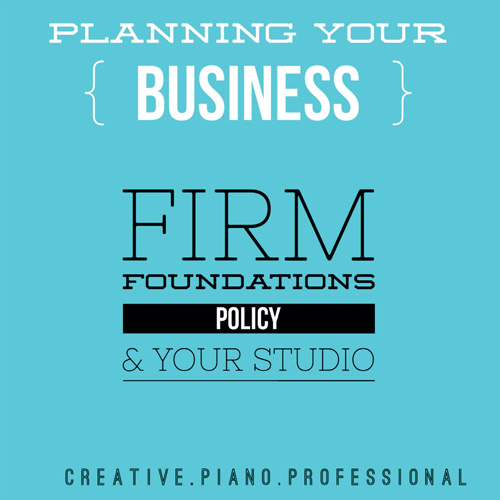Each of us has a ‘way we do things’ and our studios are no different. When it comes to communicating the way things are done in your studio, having a studio policy can be the difference between frustrating misunderstandings and clear expectations.
There are common gripes we hear from teachers; missed lessons, last minute cancellations, billing, late payments, and ‘catch-up lessons’. These are all matters that can be mitigated to a large extent by concise communication of studio policy from the outset.
A policy is a statement of intent, a document that encompasses your services and expectations and allows potential students to accept or reject this before engaging you. When a new student enquires about lessons in my studio, they are emailed our enrolment form and studio policy. Then if they choose to come on board they have done so with open eyes and clear expectations about the service and the responsibilities that comes with being a member of the studio.
So now that we have established that having studio policy is fundamental to your studio’s smooth running (no matter how large or small) what should such a policy cover?
In your studio policy it is important to outline the way you will conduct business. Sit down and work out what your ‘rules’ are in regards to service offering, enrolment and cancellation, tuition fees and payment, missed lessons, performance opportunities, books and materials, instrument, and practice.
Service Offering
Say what you will do, what your responsibilities are, and how you approach teaching. For example:
‘My Fabulous Music Studio’ provides students with a unique environment for individual music lessons tailored to their specific learning requirements.
To this you could add any particular pedagogical approach you use, lesson length, or special inclusions in your service.
Enrolment and Lesson Cancellation
Outlining your process of enrolment creates clarity for both parties. In my studio we have an enrolment form to complete giving basic student information, it also outlines our image and video release policy. Upon receipt of a completed and signed enrolment form, lessons commence.
I would recommend you have a firm idea of what you require for cancelling lesson enrolment. If you require a terms notice, just say that. Being upfront about this will save both parties trouble later on. If you anticipate continued enrolment throughout the school year, it is a good idea to include that information for parents. As much as something may seem common knowledge to us, it may not be for someone else. How about adding a sentence such as:
PLEASE NOTE: Lesson enrolment is considered ongoing. Minimum notice for lesson withdrawal is five weeks.
Tuition Fees and Payment
This is the most vital area of your studio policy. It is often the section that causes the most consternation for teachers when writing their expectations. However, it is very important that you clearly state what is expected. Areas to include are
- What do you charge and when?
- How many weeks a year do you teach and how is this arranged?
- When is the account due and how is it payable?
- Any other information about fees you charge and what they include.
Here is a suggestion for the tuition policy:
All fees are based on a school term averaging 10 weeks. Accounts will be sent by email prior to the school term and fees are payable within two weeks of the receipt of the account. This not only helps with administration, but also demonstrates firm commitment. Where there are special circumstances, we are quite willing to look at alternative payment schedules. Payments should be paid by direct deposit to ‘Your Fabulous Music Studio’.
- 30 minute lesson term cost $xyz
- 45 minute lesson term cost $zyx
- 60 minute lesson term cost $yzx
Missed Lessons
What do you do for missed lessons? What would you like to do?
In my studio missed lessons are forfeited. In exceptional circumstances we are willing to look at changes for emergency situations. Some teachers are happy to do swaps or catch-up lessons, others have lesson swap lists they coordinate for their students. This is the most asked question when I speak with teachers. I thought it best just to share my studio written policy with you so you can take from it what you wish:
While we do not have a firm and inflexible policy, you will appreciate that when enrolling in a private course, you are in fact reserving a place for the term — a place that we are obliged to keep for you. In the event of a student missing a lesson, the lesson is forfeited. If the teacher is unable to attend, the lesson will be credited or refunded.
Other Inclusions
Performance
It is wise to include any expectations you have for students in regards to participation in performances in your studio policy. State what performances you offer and how often/much they are required to participate.
Books and Materials
Will you source and invoice for books and materials directly to parents or will the student need to source the materials? Including your expectations for this will keep things clear for everyone.
Instrument and Practice
Do you require a minimum standard of instrument for students to commence lessons? Several times I have had people ask if they actually need to have an instrument at home, or if a toy piano will suffice. If you require an acoustic piano for the student to practice on, then just say it.
Similarly, if you require your students to practice a certain amount, then say it. Or make a recommendation for students to practice a suggested amount of time in order to make progress.
Unless we are clear with how we would like to run our studio, it is unlikely that students and parents will be aware of how we do things. Just as each of our studios’ is unique, so too are our policies. Make them fit your studio, keep it concise (no one likes reading long policies) and most importantly, stick to it! If you have an established studio, distributing the new policy to students at the beginning of a new term or academic year is the easiest way to implement it. For new students, just email them your studio policy prior to enrolment and you will all be on the same page and have more time to focus on making music!

[accordion]
[item title=”Fill out your own – STUDIO POLICY PLANNER”]
[/item][/accordion]
